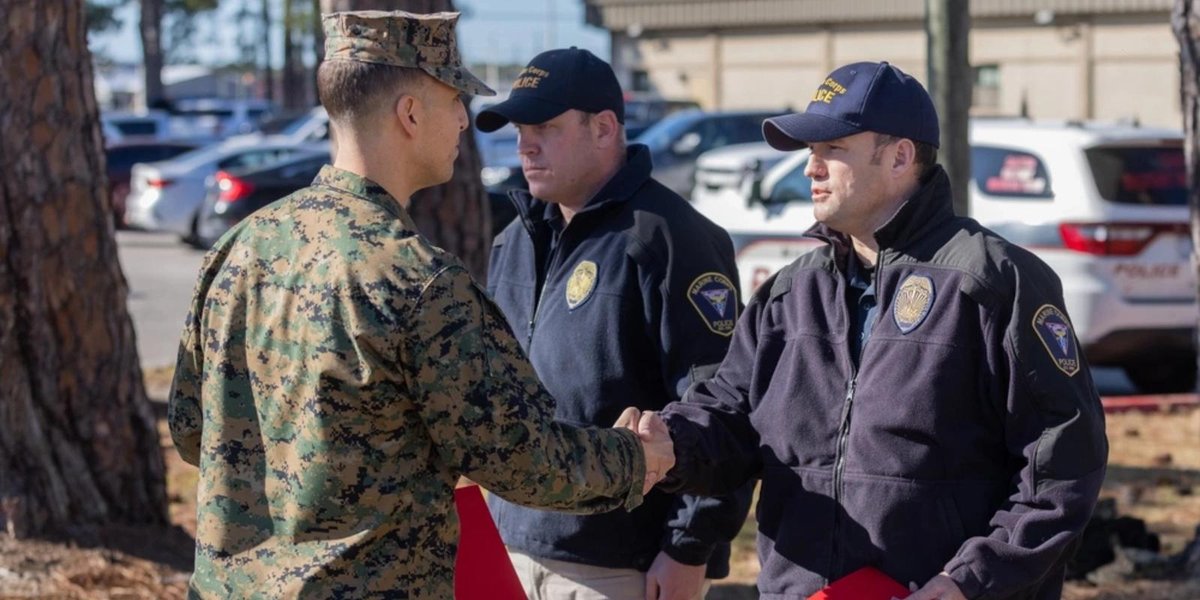MARINE CORPS POLICE OFFICER: DUTIES AND PREPARATION GUIDE

Joining the military will open a lot of opportunities, especially if you are determined to climb the upper ranks. Many are called to join the service, but only some are chosen since a small number of people have determination, willingness, proper judgment, and leadership skills. One of the best branches you can join is the Marine Corps since there are several worthwhile positions you can choose from, one of which is being a Marine Corps police officer. These highly trained department members play a vital role despite their tasks being less glamorous than combat.
The Marine Corps recruits people who possess high moral standards, have or will finish a four-year college degree, can lead, and are physically fit. Once you graduate from training, your primary role is equal to that of civilian police officers. The difference is that you will be assigned to work on military bases worldwide.
Marine Corps Police Officer Roles and Responsibilities
This is one of the vital branches of the Marine Corps that protects and guards various military bases. Marine Corps police officers monitor the entrances of a base, respond to emergency calls, and patrol, making sure that the entire area is safe. In addition, they protect evacuees, refugees, and prisoners of war. They also perform defensive and offensive combat operations. Lastly, they perform duties such as preventing crime, first response aid, managing vehicle and pedestrian traffic, and overseeing investigations.
Marine police officers are coordinators and supervisors. They are in authority to administer military law and manage the military police under their guidance, and they interact extensively with people.
Steps to Join the Marine Corps Police Force
Your application to become an officer candidate, which the Officer Selection Officer should submit, is essential for your qualification for the job. The path that you will follow depends on your education, occupational specialty preferences, and qualifications. To start the process, you need to know these essential requirements: 19 years or older, a US citizen, have normal color vision that's correctable to 20/20, 65 inches tall, have a valid driver's license, and have clarity of speech.
Being a Marine Corps police officer also includes not being convicted of illegal drugs, immoral character, or domestic violence/abuse, completing the ASVAB with a score of 100 or higher, being eligible for secret security clearance, was not convicted by special or general courts-martial, and has no history of emotional, mental or nervous disorders.
The Department of Defense will grant secret security clearance, and you will undergo an extensive background check. If you have any skeletons in your closet, you might not achieve your dream of becoming a Marine police officer. But if you are confident that you will pass, you can discuss any concerns/questions with your local Marine Corps recruiter.
Marine Corps Police Officer Preparation Guide
The Marine Corps has its own Police Academy, located at Fort Leonard Wood, Missouri, where qualified applicants will train. The Academy will prepare and train future Marine Corps police officers to be efficient. The road to becoming an officer continues beyond there. You must attend Marine Combat Training after graduating from basic training, which will last 29 days. The school is in Camp Pendleton, California, or you can go to Camp Geiger, North Carolina. You will learn essential weapon and combat skills and more specific training in convoy operations, tactical communications, and explosive devices.
The next step is to attend up to 20 weeks of Law Enforcement Military Police training at Fort Leonard Wood, Missouri. Within this timeframe, you will learn how to use a combination of practical application and verbal instructions regarding law enforcement techniques. Training from this comprises the Basic Police Officer Course and MCPA Advanced Training courses.
Once you have completed your training, you may begin with your first role as a Marine Corps police officer. Some of the tasks assigned to you include verifying visitors' credentials, monitoring suspicious activities, and more. Suppose you want to grow your career further. In that case, there are other options that you can choose from, including the following:
- Being a police dog handler
- Non-lethal warfare
- Domestic violence intervention officer
- Joining the criminal investigation division
- Learning advanced crime scene investigative techniques
- Protective services training
- Joining the special reaction team
Suggested reads:
- Should You Capitalize Military Ranks? And More: An Intro to Military Ranks
- A Complete Guide to Military Police Salary & Requirements
- Which Branch of the Military Should I Join? What to Consider
Sources:
Join the Conversation
Allison Kirschbaum
Veteran, Military History & Culture Writer at MyBaseGuide
Allison Kirschbaum is a Navy Veteran and an experienced historian. She has seven years of experience creating compelling digital content across diverse industries, including Military, Defense, History...
Allison Kirschbaum is a Navy Veteran and an experienced historian. She has seven years of experience creating compelling digital content across diverse industries, including Military, Defense, History...
Credentials
- Navy Veteran
- 7 years experience in digital content creation
- Expertise across Military, Defense, History, SaaS, MarTech, FinTech industries
Expertise
- Military History
- Naval Operations
- Military Culture
SHARE:



